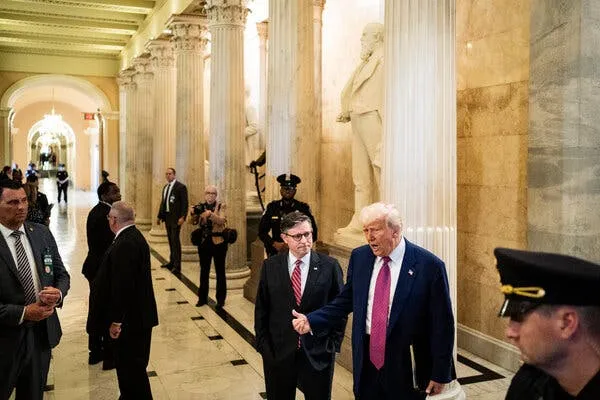Trump Squeezes His Party on Domestic Policy Bill Amid Growing Concerns
As Congress gears up for another contentious session, the spotlight firmly rests on former President Donald Trump, whose influence continues to resonate within the Republican Party. With a sweeping domestic policy bill on the table, GOP lawmakers find themselves in a tense standoff, as they wrestle with their party’s agenda, fiscal responsibilities, and Trump’s enduring hold over the base.
GOP Search for Votes
The path forward for the GOP seems laden with obstacles. The House GOP’s key committee convened recently to address the impending domestic policy bill, a crucial piece of legislation that seeks to address a myriad of issues from healthcare reform to infrastructural investments. Members are feeling the pressure to align with both party leadership and the influential voices within the Trump camp.
As the committee meets, a palpable sense of concern hangs in the air regarding the logistics of achieving a consensus. The Republican Party is currently fractured, with various factions advocating for differing priorities. While centrist Republicans prioritize economic stability and fiscal responsibility, Trump-aligned lawmakers are increasingly vocal about pushing for more conservative and populist measures.
Trump’s Stranglehold on GOP
Former President Trump, despite leaving office nearly two years ago, continues to shape the trajectory of the GOP’s domestic agenda. His populist approach, coupled with a gravitation towards fiscal hawkishness, complicates the party’s efforts to maneuver through a $4 trillion deficit—an issue that weighs heavily on legislators and affects their political calculations.
Experts suggest that Trump’s vocal endorsement of certain legislative priorities has a dual effect. On one hand, his backing can mobilize the party’s base, but on the other, it alienates fiscal conservatives who are increasingly worried about the sustainability of spending policies that could exacerbate the deficit.
A Delicate Balance
For GOP lawmakers, finding a delicate balance between supporting a robust domestic policy agenda and curbing the national deficit is no easy task. With Trump’s endorsement of expansive policies such as tax cuts and increased spending on domestic programs, Republicans face the daunting challenge of reconciling these desires with the reality of rising national debt.
Rep. Kevin McCarthy, the House Majority Leader and a key figure in the GOP’s strategy, stated, “We have to address our fiscal challenges without undermining the important services and programs that support American families. However, we cannot ignore the call from our constituents who expect us to rein in spending and prioritize our national budget.”
Internal Discontent
Within the party, there is growing discontent among lawmakers who fear that Trump’s methods could ultimately weaken the GOP’s position in upcoming elections. Some legislators are vocalizing concerns regarding the potential for alienating moderate voters who prioritize fiscal responsibility over the party’s more radical policy shifts.
Rep. Liz Cheney, a prominent critic of Trump and a steadfast advocate for fiscal discipline, recently emphasized, “We must recover and build trust with our constituents. If we keep veering off course by catering to completely unfounded spending initiatives, we will face dire electoral consequences. The American people expect integrity and accountability.”
The Impacts of Party Identity
As Trump continues to press for policies that align with his brand of populism, many within the GOP are grappling with their identity. The struggle reflects the broader ideological battle within the party, as it attempts to navigate between traditional Republican values and the populist agenda that Trump has championed since 2016.
This ideological conflict has resulted in many lawmakers considering their electoral futures against the backdrop of a potential Trump-led resurgence in 2024. The competing interests complicate consensus-building, as legislators align with their ideological beliefs versus political survival.
The Financial Reality
One of the most pressing issues influencing the discussions around the domestic policy bill is the reality of the current budget situation. The United States faces a staggering deficit that has ballooned to $4 trillion, a level that raises alarms among conservative economists and party stalwarts alike.
Fiscal hawks within the GOP argue that addressing the deficit should be the party’s top priority, a perspective shared by fixed-income voters who have become increasingly concerned about inflation and government spending. However, Trump’s focus on domestic initiatives that require financial investment risks exacerbating deficits while challenging the GOP’s longstanding reputation as the party of fiscal discipline.
Party Unity at Stake
The potential for rifts within the party places its electoral fortunes at risk as the midterm elections approach. The GOP needs to present a united front to defeat the Democrats and reclaim congressional seats. Divisions over Trump’s influence on spending and the party’s direction could ultimately hinder their prospects.
In a recently conducted survey, a significant portion of Republican voters expressed their loyalty to Trump while also demonstrating a desire for the party to prioritize fiscal matters. “We want to support Trump, but not at the cost of our future,” noted one voter. Such sentiments highlight the precarious position that GOP lawmakers occupy.
Looking Ahead
As the House GOP committee moves forward with deliberations, the path ahead remains uncertain. The interplay between Trump’s assertive push for a more ambitious domestic agenda and the need for fiscal restraint will likely culminate in a legislative showdown.
With the growing emphasis on fiscal responsibility and the need to address the national deficit, the party must reconcile these complexities to forge a cohesive strategy that appeases the various factions within the GOP.
Ultimately, the way forward hinges not only on high-stakes negotiations over the domestic policy bill but also on the GOP’s willingness to resolve its internal divides and present a unified agenda to the American public. As Trump’s influence continues to loom, the GOP must tread carefully in balancing populist desires against fiscal realities to ensure not only party sustainability but the future stability of the American economy.
Conclusion
The upcoming domestic policy bill provides an important test for the Republican Party and its leaders—including Trump. Will they choose to embrace a sound fiscal approach or heed the calls for expansive spending initiatives that could further inflate the deficit? The eyes of the nation are watching with bated breath, as the ramifications of these decisions will echo beyond mere politics, shaping the very foundation of American governance.






